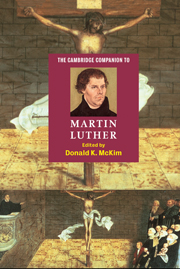Book contents
- Frontmatter
- Part I Luther’s life and context
- Part II Luther’s work
- 3 Luther’s writings
- 4 Luther as Bible translator
- 5 Luther as an interpreter of Holy Scripture
- 6 Luther’s theology
- 7 Luther’s moral theology
- 8 Luther as preacher of the Word of God
- 9 Luther’s spiritual journey
- 10 Luther’s struggle with social-ethical issues
- 11 Luther’s political encounters
- 12 Luther’s polemical controversies
- Part III After Luther
- Part IV Luther today
- Select bibliography
- Index
7 - Luther’s moral theology
from Part II - Luther’s work
Published online by Cambridge University Press: 28 May 2006
- Frontmatter
- Part I Luther’s life and context
- Part II Luther’s work
- 3 Luther’s writings
- 4 Luther as Bible translator
- 5 Luther as an interpreter of Holy Scripture
- 6 Luther’s theology
- 7 Luther’s moral theology
- 8 Luther as preacher of the Word of God
- 9 Luther’s spiritual journey
- 10 Luther’s struggle with social-ethical issues
- 11 Luther’s political encounters
- 12 Luther’s polemical controversies
- Part III After Luther
- Part IV Luther today
- Select bibliography
- Index
Summary
APPROACHING LUTHER’S ETHICAL THOUGHT
A proper understanding of Luther's ethical thought is hampered in two ways. First, contemporary ideas of ethics as a discipline in its own right, when projected back on to Luther, are likely to fail, as his ethical thought cannot be separated from doctrinal considerations within the whole scope of his theology. Instead of singling out his “ethics,” then, we must rather explore his “moral theology,” the web of theological thought of which the texture of his moral ideas is composed.
The second complicating factor is that Luther's ethic has elicited a degree of passionate apologetic and repudiation rare among theological ethics, and thereby has been exceptionally exposed to one-sided and distorted interpretations. Consequently, no account of his moral theology can be given without some engagement with those interpretations and their problematic claims.
A look at the history of the reception of Luther’s theology arouses our suspicion of monistic accounts such as Hegel’s Luther of “freedom,” Karl Holl’s Luther of “conscience” ormany a theologian’s Luther of “justification.” These fall short not because they overemphasize one aspect of Luther’s thought to the disadvantage of others, but because they fail, in most cases, to do justice to the very concept focused on. Hegel, for example, was not wrong to present Luther’s theology as a theology of freedom; rather, his account of freedom was flawed because his portrayal of Luther as the founding father of modern individualism by virtue of his superseding traditional authority could not be reconciled with Luther’s strong theological concept of authority.
- Type
- Chapter
- Information
- The Cambridge Companion to Martin Luther , pp. 120 - 135Publisher: Cambridge University PressPrint publication year: 2003
- 4
- Cited by

